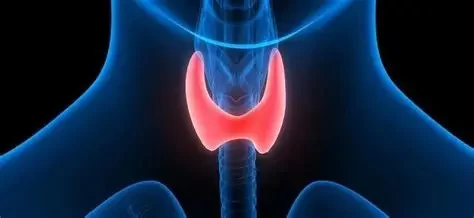- Thyroid-Function-and-Why-It-Matters-for-Your-Heart
- How-Hypothyroidism-Affects-Cardiovascular-Health
- The-Link-Between-Hyperthyroidism-and-Heart-Disease
- Real-Life-Case-Examples-from-American-Patients
- Diagnosing-and-Managing-the-Heart-Thyroid-Connection
- When-to-Seek-Specialist-Support-and-Trusted-Resources
1. Thyroid Function and Why It Matters for Your Heart
The thyroid is a small butterfly-shaped gland located in your neck, but its influence on the body is anything but small. It produces hormones—primarily T3 (triiodothyronine) and T4 (thyroxine)—that regulate metabolism, energy production, and even mood. But one of the most overlooked impacts of thyroid health is its direct relationship with your cardiovascular system.
Thyroid disorders can lead to subtle or serious changes in heart rate, blood pressure, and cholesterol levels. Whether it's an underactive thyroid (hypothyroidism) slowing the heartbeat or an overactive one (hyperthyroidism) pushing it into dangerous arrhythmias, the connection is medically significant and increasingly common in the U.S.

2. How Hypothyroidism Affects Cardiovascular Health
2.1 Slower Heart Rate and Reduced Cardiac Output
In patients with hypothyroidism, the body’s metabolic rate slows down. This often results in a reduced heart rate (bradycardia), decreased cardiac output, and lower systolic blood pressure. Over time, the heart’s ability to pump efficiently can weaken, leading to fatigue and shortness of breath.
Atlanta Heart Specialists
atlanta heart specialists
4375 Johns Creek Pkwy #350, Suwanee, GA 30024, USA

2.2 High Cholesterol and Increased Atherosclerosis Risk
One of the silent effects of hypothyroidism is the elevation of LDL (bad) cholesterol and triglycerides. When left untreated, this can contribute to the buildup of arterial plaque, raising the risk for atherosclerosis and coronary artery disease. Studies show that patients with untreated hypothyroidism are more likely to suffer from heart attacks, especially those over age 50.
2.3 Diastolic Hypertension and Fluid Retention
Low thyroid hormone levels can also cause fluid retention and increased vascular resistance, which raises diastolic blood pressure. This form of hypertension can strain the heart over time, especially when paired with weight gain—a common symptom of hypothyroidism.
3. The Link Between Hyperthyroidism and Heart Disease
3.1 Elevated Heart Rate and Risk of Atrial Fibrillation
When thyroid hormone levels are too high, the heart tends to beat faster—often at rest. This condition, known as tachycardia, can evolve into atrial fibrillation (AFib), an irregular and often rapid heart rhythm that increases the risk of stroke and heart failure.
3.2 Palpitations, Chest Pain, and Exercise Intolerance
Many people with hyperthyroidism report frequent heart palpitations or episodes of racing heartbeats. These symptoms often make physical activity difficult and can lead to anxiety. Over time, the constant overstimulation may cause enlargement of the heart’s chambers and eventual weakening of cardiac muscles.
3.3 Heart Failure in Severe Cases
In untreated or severe cases—such as thyroid storm—hyperthyroidism can result in high-output heart failure, especially in older adults or those with preexisting heart conditions. This form of heart failure happens when the heart can't meet the body's increased metabolic demands.
4. Real-Life Case Examples from American Patients
Consider the story of Sarah, a 38-year-old from Atlanta. She had been feeling unusually tired and noticed swelling in her legs. Initial blood tests revealed elevated TSH levels, confirming hypothyroidism. However, further cardiac evaluation showed she was also dealing with early-stage heart failure due to prolonged undiagnosed thyroid issues. With proper hormone therapy and cardiac support, she recovered—but only after months of treatment.
On the other hand, Mark, a 62-year-old retired firefighter from Denver, was diagnosed with hyperthyroidism after being admitted to the ER with atrial fibrillation. “I thought it was just stress,” he said. “Turns out, my thyroid was overworking my heart.” After treatment with beta-blockers and thyroid regulation, his heart rhythm returned to normal within three months.
5. Diagnosing and Managing the Heart-Thyroid Connection
5.1 Blood Tests and Early Detection
The first step in identifying thyroid-related heart issues is a simple blood test measuring TSH, Free T3, and Free T4 levels. When combined with ECG or echocardiograms, doctors can detect the dual impact on both endocrine and cardiac function.
5.2 Medication and Monitoring
For hypothyroidism, the standard treatment is levothyroxine, a synthetic thyroid hormone. As hormone levels stabilize, cardiac symptoms often improve. In the case of hyperthyroidism, treatment may involve antithyroid medications, beta-blockers, or radioactive iodine therapy, all of which require cardiac monitoring.
5.3 Holistic and Lifestyle Considerations
Thyroid and heart health are deeply intertwined with lifestyle. Regular exercise, a balanced diet rich in iodine and selenium, stress management, and limiting stimulants like caffeine all play a role in supporting both systems. Patients are encouraged to work closely with both endocrinologists and cardiologists for comprehensive care.
6. When to Seek Specialist Support and Trusted Resources
If you’re experiencing symptoms like persistent fatigue, chest pain, irregular heartbeat, or swelling, don't wait. These could be signs of a thyroid disorder affecting your heart. Early intervention is crucial. Many patients mistake symptoms for general aging or stress, but proper testing can provide clarity and lead to effective treatment.
For individuals in the U.S. looking for tailored advice and care providers who understand the complexities of thyroid and cardiovascular interactions, we recommend exploring services at HeartCare Hub. Whether you're seeking diagnostics, second opinions, or long-term management, expert help is closer than you think.






















Deborah Heart and Lung Center
deborah heart and lung center
200 Trenton Rd, Browns Mills, NJ 08015, USA